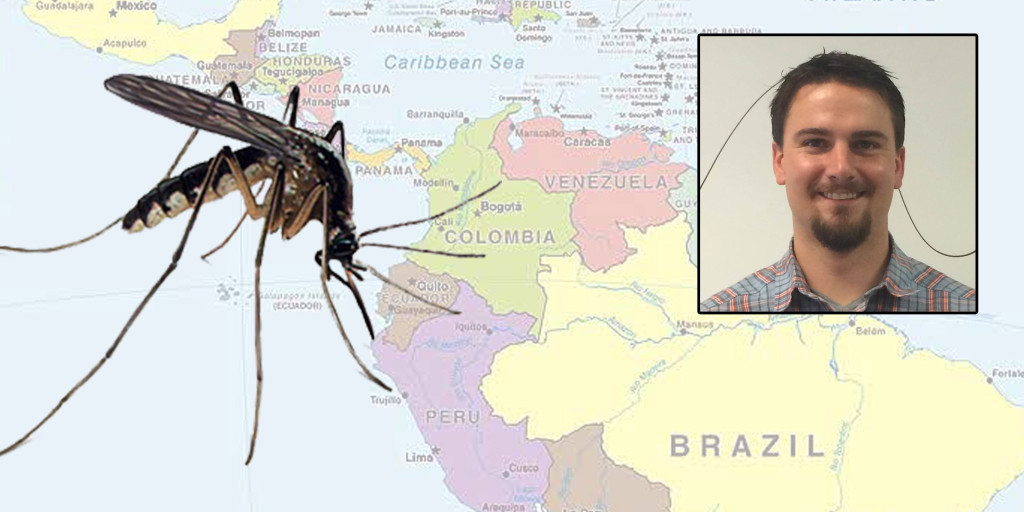How the Zika virus is starting to affect Malvern
The Zika virus first made headlines in the United States this year, but has been affecting Brazil since April of last year, and other Latin American countries since January.
Mr. Michael Prosalik, who taught biology at Malvern for two years (2013-2015), has been living in São Paulo, Brazil for about six months. Now, he teaches biology and integrated science at an international school.
“No one I know personally has been diagnosed with Zika,” he said. “But it is hard to get tested for the virus, and is even harder for those who might not have the resources to get tested.”
São Paulo is in southern Brazil, where average temperatures are below 80° Fahrenheit, and Prosalik said that there aren’t that many mosquitoes.
“Our windows and doors in Brazil don’t have screens,” he said. “My windows are open near 24 hours a day, and we haven’t seen many mosquitoes – maybe a few here and there.”
Prosalik said that areas of Brazil hit harder by Zika include the state of Bahia in the center of the country, with the largest city being Salvador.
“My wife and I visited there over Christmas,” Prosalik said. “We took the normal precautions, insect repellant, bed nets, and there wasn’t a problem.”
The Zika virus is spread through mosquito bites, and causes rashes, joint pain, fever, and headache. There is an added risk for pregnant women, as there has been a link with Zika and microcephaly, a neurological disorder which results in abnormally small heads in infants.
The virus currently is found in over 17 countries in South and Central America, including two destinations for rising seniors on their Christian Service trip – Costa Rica and the Dominican Republic.
Director of Christian Service Mr. Larry Legner said that Zika is just one of the diseases juniors have to be vigilant about.
“We instruct juniors heading to Costa Rica, for example, to get the flu shot, and they all have to have hepatitis and tetanus shots in case they are cut or something,” he said. “They also have to get the typhoid shot.”
Legner said that although some parents have brought up concerns about the virus at various meetings, there isn’t much threat to the students.
“I think for the general population, the hysteria might be overblown,” he said. “But if I were a pregnant woman, I wouldn’t go near any country with the infection.”
Legner said he would make sure that any female chaperones heading to those countries are not pregnant, and ask them to go somewhere else if they are.
He also gave each service group instructions to avoid mosquito bites, even those traveling to countries without the Zika virus.
“Everything I’ve read is that the mosquitoes bite during the day,” he said. “And I’ve told every group the first thing you do is put on sunscreen, have breakfast, and then the bug repellent, because it’s not just mosquitoes where they go.”
Legner also recommends students use dryer sheet to fend off insects.
“They work fabulously,” he said. “People think I’m crazy, but rub them on your clothes, put the sheet in your pocket, and they keep bugs away.”
School nurse Mrs. Catherine McGettigan said that while Zika may be overblown, “anything is possible, but not probable,” for the Malvern service groups.
She also gave a voice of caution about the lack of significant symptoms. “80% of the people who are infected with the Zika virus don’t even know they have it, because the symptoms are so mild,” McGettigan said.
“Even those that are infected aren’t that sick,” she said. “A lot of adults will push through and just go to work, saying ‘Oh, I’m catching something, I’ll be fine.’”
McGettigan said the last time Malvern dealt with the threat of a large infection was with the H1N1 flu in 2009.
“The teachers were to project a long-term teaching plan in case the students were home for four to six weeks,” she said. “Luckily, they didn’t have to go there.”
Zika is not the only issue currently facing Brazil. Before Prosalik moved to São Paulo, the city and the country at large were facing issues with water shortages due to drought and mismanagement of reservoirs.
“Even after a large wet season, the reservoir levels are still lower than usual,” Prosalik said. “So there are still water shutoffs for some in the city. Where I live, we just have to abide by a limit to water use, so apart from conservation, it isn’t much of a problem to me.”
In light of the media frenzy over the virus, Prosalik said that there just needs to be general caution for Americans traveling to Brazil.
“Whenever you go to another country, there’s always something that’s different,” he said. “Zika is just one of many mosquito-borne illnesses, such as Yellow Fever, West Nile, and Dengue. Besides normal precautions, there isn’t much that can be done.”








